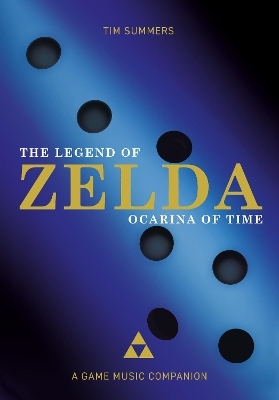
The Legend of Zelda: Ocarina of Time
Intellect Books (Verlag)
978-1-78938-227-3 (ISBN)
Given music’s well-established significance for the video game form, it is no coincidence that music is placed at the forefront of this most lauded and loved of games. In Ocarina of Time, music connects and unifies all aspects of the game, from the narrative conceit to the interactive mechanics, from the characters to the virtual worlds, and even into the activity of legions of fans and gamers, who play, replay and reconfigure the music in an enduring cultural site that has Ocarina of Time at its centre. As video game music studies begins to mature into a coherent field, it is now possible to take the theoretical apparatus and critical approaches that have been developed in antecedent scholarship and put these into practice in the context of an extended concrete game example.
The most extensive investigation into the music of a single game yet undertaken, this book serves three important primary purposes: first, it provides a historical-critical account of the music of an important video game text; second, it uses this investigation to explore wider issues in music and media studies (including interactivity, fan cultures, and music and technology); and third, it serves as a model for future in-depth studies of video game music.
Tim Summers is lecturer in music at Royal Holloway, University of London. He is the author of Understanding Video Game Music and a cofounder of the Ludomusicology Research Group.
Chapter 1. Introduction
Chapter 2. The music of Ocarina of Time in context
Nintendo’s game franchises
The Legend of Zelda
Kondo’s approach to music in The Legend of Zelda
Music on the Nintendo 64
Music in Ocarina of Time
Chapter 3. The ocarina and Link’s musical performances
The ocarina
Why an ocarina?
Playing Link’s ocarina
Beyond the four notes
Learning the ocarina songs
The songs
Plot-advancing and assistance melodies
Warp songs
The Scarecrow’s song and other performances
The Fabulous Five froggish tenors
The Skull Kids
Musical performance in Ocarina of Time
The function of musical performance in games
Chapter 4. Location cues
Part I. Hyrule Field
A familiar tune
Introduction
Day tags
Reflective tags
Battle tags
Music, the player and geography
Part II. Location cues featuring ocarina songs
Epona’s song and Lon Lon Ranch – Associations of ranch life
The Temple of Time and the Song of Time – Cathedral soundscape
Windmill and the Song of Storms – Strange circularity
Saria’s song and the Lost Woods – Jolly repetition and misdirection
Part III. Dungeon cues
Inside the Deku Tree – Organic timbres
Dodongo’s Cavern – Audio textures of metal and stone
Inside Jabu-Jabu’s belly – Fishy rumblings
Forest Temple – Sounds of the forest
Fire Temple – Voices heard and unheard
Ice Cavern – Crystalline chimes
Water Temple – A dungeon on the Danube?
Shadow Temple and the bottom of the well – Voices and drums from the depths
Spirit Temple
Ganon’s Castle
Part IV. Towns
Kokiri Forest – Optimism and ornamentation
Castle Town market – Evoking European traditions
Kakariko Village – A wistful safe haven
Goron City – Sounding the materials of the mountain
Zora’s domain
Gerudo Valley – Hispanic traditions in the desert
Part V. Recurring types of location
Shops – Hyrule’s consumer soundtrack
Sideshow minigames – The fairground connection
Houses – A musical starting point
Potion shops, ghost shops and lakeside laboratory – Little shops of horrors?
Fairy Fountain/start menu – Angelic harps
Music for locations
Chapter 5. Character themes and cutscenes
Part I. Character themes
Zelda’s theme – Lilting lullaby
Ganondorf’s theme – Alarming chords and brooding sequences
Sheik – Atypical warrior’s theme
Kaepora Gaebora (the great wise owl) – Authority and levity
Great Deku Tree – Ancient uncertainty
Koume and Kotake
A noticeable omission
Part II. Other cutscenes
Opening – An unexpected start
Flying – Musical sequences for beating wings
Legends, spirits and goddesses
Rewards and milestones
End credits – Finale ultimo
Ocarina of Time 3D
Music for cutscenes
Chapter 6. Ludic cues
Part I. Combat music
Musical features of combat cues
Implementation in the game
Boss victory cue
Part II. Cues for treasure and challenges
Acquisition cues
Music for puzzles
Music for losing – Game over
Minigames – Frivolous fun
Special sequences
Aestheticizing the Ludic
Chapter 7: Interfaces and sound effects
Earcons for interfaces
Menus and dialogue
Targeting system
Musical sound for interfaces and information
Musicality and magic
Sound and motion
Enemy sound effects
Conclusions
Chapter 8. Ocarina afterlives
Later games
Parallel world – Majora’s mask
Selective franchise continuity
Decontextualizing sound
A multi-valent musical medium
| Erscheinungsdatum | 10.05.2021 |
|---|---|
| Reihe/Serie | Studies in Game Sound and Music |
| Mitarbeit |
Herausgeber (Serie): Mark Sweeney, Tim Summers, Michiel Kamp, Melanie Fritsch |
| Zusatzinfo | 118 Halftones, black and white |
| Verlagsort | Bristol |
| Sprache | englisch |
| Maße | 170 x 244 mm |
| Gewicht | 735 g |
| Themenwelt | Kunst / Musik / Theater ► Musik |
| Sozialwissenschaften ► Kommunikation / Medien ► Medienwissenschaft | |
| ISBN-10 | 1-78938-227-0 / 1789382270 |
| ISBN-13 | 978-1-78938-227-3 / 9781789382273 |
| Zustand | Neuware |
| Haben Sie eine Frage zum Produkt? |
aus dem Bereich


